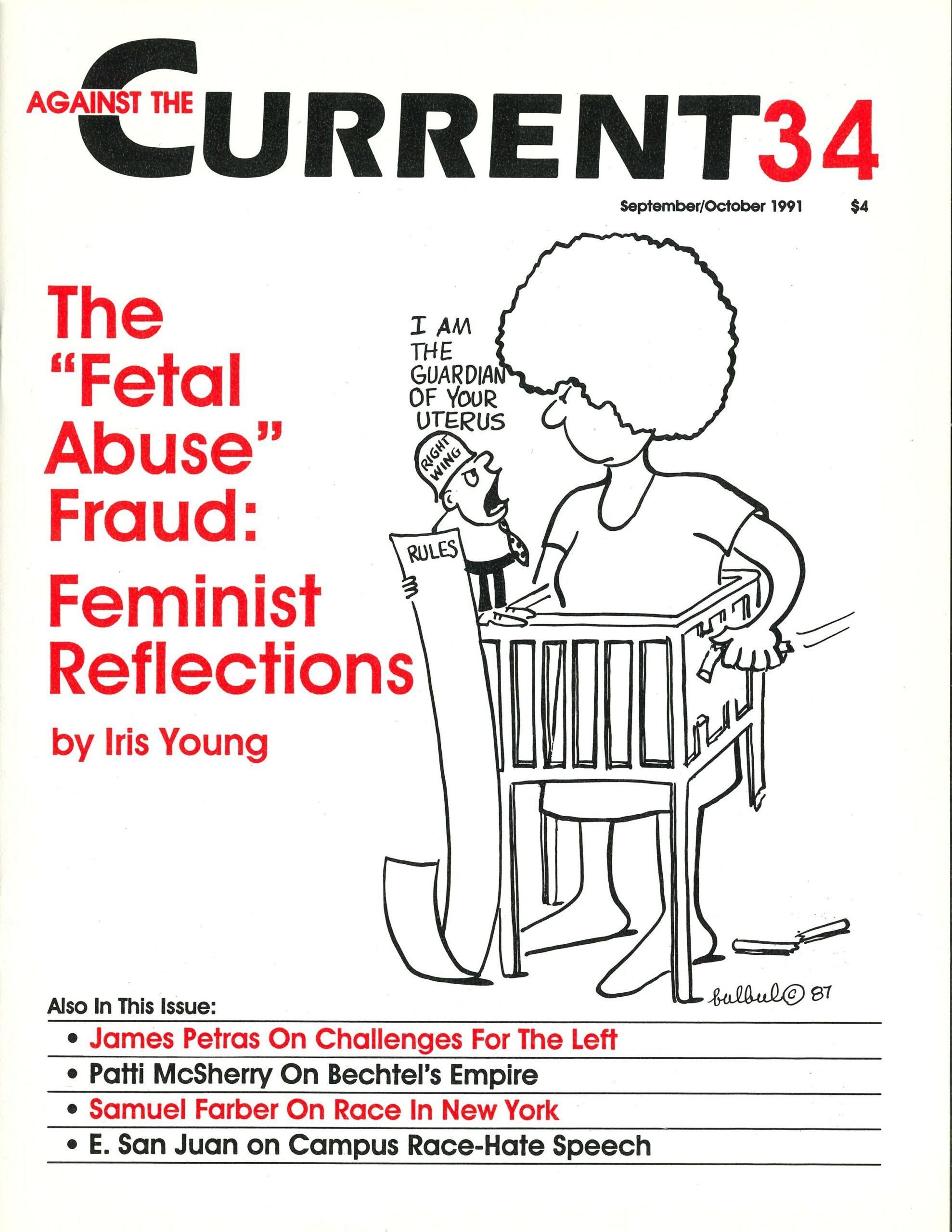Against the Current, No. 34, September/October 1991
-
Abort the Court
— The Editors -
Leonard Peltier: New Try for Justice
— Bob Robideau - Update on Peltier's Case
-
Peru Hovering at the Edge
— Peter Drucker interviews Javier Diez Caseco Cisneros -
The Work That Kills--"Karoshi"
— Ben Watanabe -
Dominican Workers' General Strike
— ATC interviews Barbara Harvey -
Pregnancy, Drugs & the State
— Iris Young -
Rebel Girl: The Sows of Summer (1991)
— Catherine Sameh -
A Festival of the Oppressors
— David Finkel -
Challenge for the Left
— James Petras -
Politics Under Socialism
— David Edelstein - ACLU Policy Statement
-
Theorizing Anti-Racist Struggle
— E. San Juan, Jr. - Stanford's Policy on "Hate" Speech
-
Profiling Bechtel Group, Inc.
— Patti McSherry -
Random Shots: When We Were Young
— R.F. Kampfer -
An Attack on Entitlements
— James Rytting -
A Reply to James Rytting
— Johanna Brenner -
Letter from Hartford
— Richard Greeman -
Forgetting Race in New York
— Samuel Farber -
Oscar Wilde: Rediscovered Radical
— Peter Drucker
Catherine Sameh
THELMA & LOUiSE Has everyone talking. And well it should. It is one of the most interesting mainstream films to come along for an eternity. But its forthright feminism has been a rather bitter pill for the popular press to swallow, and they’ve been spitting up their bilious criticisms all summer.
Ralph Novak of People magazine chokes, “Any movie that went as far out of its way to trash women as this female chauvinist sow of a film does to trash men would be universally and justifiably condemned. I wish he were right, but unfortunately, trashing women in films is commonplace and we’ve yet to see universal—.or even small-scale—condemnation.
What Novak and his male contemporaries really miss, though, is what so many white film critics missed about Do the Right Thing. Like the riot that erupts at the very end of Spike Lee’s film, Thelma and Louise’s pointed responses to sexism and rape don’t leave them or us with feel-good resolutions and happy endings.
Instead, both films map out the terrain of exploitation through which their characters travel, inviting the audience to cheer on the big and small ways in which the victims rise up. Furthermore, both Callie Khouri/RidJey Scott and Spike Lee sculpt marvelously human characters who maybe don’t always do the right things but who—like all oppressed people who face incredible odds—struggle to resist, using tools that are within their reach.
That is why women leave Thelma & Louise feeling both truly inspired and deeply disturbed. It is a film as much about the numerous battles, internal and external, to women’s self-emancipation as it is about our individual and combined capacities to free ourselves.
While Novak condemns Thelma and Louise’s “self-absorption,” John Leo of U.S. News and World Report warns us of the film’s “explicit fascist theme.” Self-absorption is the best thing that happens to Thelma after spending years with a serious asshole for a husband, almost being raped, and being constantly objectified by the men she encounters. As for Louise, her life has been a series of compromises and hard work, defending it as well as Thelma’s is no easy task.
But I suppose it’s true: You start with two ordinary women defending—and then running for—their lives and the next thing you know, the paramilitary working-class women’s army has taken over a good portion of the United States to begin executing men. If only someone would make that film!
Fighters, Not Lambs
I can’t help but compare Thelma & Louise to Silence of the Lambs, a movie that the mainstream press hurried to put forward as a raging feminist film. One of the most violent films I’ve seen in a long time, Silence of the Lambs is more comforting to male critics because it locates misogynist violence within one “deranged” individual (the fact that he’s a transvestite has stirred controversy as well).
We are supposed to feel relieved when the FBI trainee, Clarice, finally nails the serial killer. Our heroine is not subject to scrutiny for fighting back, because she does so through a patriarchal, state-sanctioned institution that we all know perpetuates misogyny more than any one “psycho” ever could.
While Clarice does have to wrestle with sexism in the FBI, her -bravery-(not self-absorption) is ultimately validated by her male mentors—one a killer in prison and one her mentor at the FBI.
But Thelma and Louise take on all the men in the film, exposing how sexism works in its vulgar, ordinary and sophisticated forms. Unlike Clarke—who needs men to win her battle—Thelma and Louise rely on, learn from and finally support each other in their heroic, often desperate journey on the long road to freedom.
They refuse to capitulate to the desire of men on all levels, trusting instead in themselves and each other. In that, they are victorious.
September-October 1991, ATC 34

